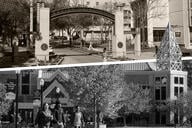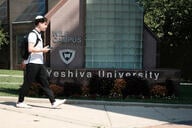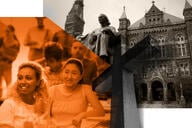You have /5 articles left.
Sign up for a free account or log in.
W. King Mott, associate professor of political science and gender studies at Seton Hall University, clearly has earned respect from colleagues at the Roman Catholic institution. He has tenure. He recently finished a term as chair of the Faculty Senate. He served on the search committee for a new president.
But he's quite certain he'll never be an administrator. "There is no way the current hierarchy will allow a gay person to hold a position of authority unless they are closeted and self-loathing. They will never permit a scholar who publishes a point of view" promoting gay equity to hold a position of real authority, he said. Mott was demoted from associate dean back to the faculty ranks in 2005 the day after he wrote a letter to the editor of a New Jersey newspaper in which he questioned church leaders for criticizing gay men while "permitting and hiding pedophiles within the priesthood." The university cited his use of his title as associate dean as the reason for the demotion.
Mott is facing scrutiny once again -- this time for a course he is planning on the history of the legal and political fights over marriage, in which he will discuss gay marriage and his views as a gay man in favor of it. Although the new course went through standard approvals, it is now being subject to an additional review by the Mission and Identity Committee of the university's Board of Regents. That review was requested by the Rev. John J. Myers, archbishop of Newark, who denounced the course for seeking "to promote as legitimate a train of thought that is contrary to what the church teaches."
Catholic colleges are of course regularly the site of debates over the role of religious teachings in the context of American higher education. At commencement time, most notably last year at the University of Notre Dame, honorary degrees for or speeches by political leaders who support abortion rights are questioned by some church leaders. Valentine's Day is an annual barrage of press releases and counter-releases about productions of The Vagina Monologues on Catholic campuses.
But amid those debates, the academic leaders of the institutions are frequently quick to point out that the faculties of their colleges include people of many faiths (or no faith) and many views on church teachings. The headlines over a Vagina Monologues production being forced off campus, they note, don't reflect the reality of deep commitment to academic freedom in the classroom and in academic decisions.
And that may explain why many professors and students at Marquette University have become so concerned and angry in the last week. The university rescinded an offer to the woman who was supposed to be its next dean of arts and sciences. The woman, Jodi O'Brien, is a sociologist at Seattle University who is a lesbian and whose scholarship has focused on sexuality and gender. O'Brien was very open about her sexual orientation and her scholarship with the search committee, which in turn was open with senior administrators at Marquette, who first offered her the job and then rescinded it.
The university maintains that she was found inappropriate for the position because of some of her writings, not for her sexual orientation. Either way, faculty leaders see a violation of academic freedom and of the principles of shared governance.
The controversy over O'Brien's rescinded appointment and Mott's demotion five years ago (and controversy today over his planned course) have some faculty members fearful about a new glass ceiling at Catholic institutions. Gay scholars may win tenure and say what they wish, they fear, but they can't rise too high. And if Catholic colleges are defined as places that limit those who are gay or who speak out about gay scholarship, the institutions risk being branded as intolerant, they say.
G. Dennis O'Brien (no relation to Jodi O'Brien), author of The Idea of the Catholic University (University of Chicago Press) and former president of the University of Rochester and Bucknell University, said that the Marquette situation reminded him of an experience he had applying for a presidency he did not get at an institution that, like the two he led, was not Catholic. He heard from colleagues that the search committee was asking around about whether his Catholic faith made him biased and somehow unsuited for a presidency. "I thought it was an awfully stupid question to ask," he said. "But anti-Catholicism has been for many years the anti-Semitism of the intellectual class."
Thinking about the Marquette situation, he said, he sees similarities. "Presumably you hire deans because they are expert academic managers. Your sexual orientation should not enter into your behavior as a dean. And if your scholarship is about lesbianism, there is nothing wrong with that. That's a perfectly legitimate field," he said. While the idea of a lesbian dean at a Catholic university may seem shocking to some, he said he never would have believed it possible -- when he joined Princeton University's faculty in 1958 -- that the institution would one day be led by a woman.
Others, however, say that Catholic institutions shouldn't be expected to act like all other colleges. "Catholic institutions choose to be Catholic -- nobody forces them to be. In so choosing, they have a responsibility to the students and the faculty and to the church and one of those is to clearly communicate church teaching," said Melanie M. Morey, co-author of Catholic Higher Education: A Culture in Crisis (Oxford University Press) and a consultant at the Catholic Education Institute.
"The secular model of higher education is the predominant one," she said, "but the assumption that this is the only model is wrong."
The Search
At Marquette, the search committee that selected Jodi O'Brien was not oblivious to the idea that her hiring might set off a controversy. O'Brien (who did not respond to requests for an interview) is open about her sexuality and research. Her record is open enough that, after people heard about her as a serious candidate, search committee members received a letter from a Catholic high school threatening not to send students to Marquette should she be hired.
Stephen Franzoi, a professor of psychology who was on the search committee, said that as it became clear that O'Brien was a serious candidate, search committee members "sought and received assurances" from the provost and others that they wouldn't have to rule her out. In the end, some on the search committee feared that the president "wouldn't have the courage to hire her," and so the search committee forwarded two names as recommended hires.
Of O'Brien, the search committee said that she would be outstanding, but that the university shouldn't hire her "unless the president or the provost were prepared to stand by her should anybody challenge her based on her sexual orientation or her scholarship," Franzoi said.
Franzoi said that the committee -- including members who thought O'Brien was the best candidate -- believed that the worst possible outcome for the university would be to hire O'Brien, have her attacked, and then for the university to get rid of her. (In other words, what happened.) He noted that in the interview, she talked about her commitment to Jesuit higher education (both Seattle and Marquette are Jesuit institutions). "We thought she was the best suited in articulating the Jesuit mission of the university, and we thought she had the vision to move us to the next level."
Rev. Robert A. Wild, the president of Marquette, was not available for an interview. But he told a faculty meeting that his decision to rescind the offer to O'Brien was "not about sexual identity." He said that the university has many "men and women who are homosexual" and "who do great work" and that discriminating on the basis of sexual orientation would be "against our Catholic faith." Marquette University's anti-discrimination statement specifically includes sexual orientation among those factors on which the university bars bias.
Father Wild's statement indicated that the reason he reversed the decision was because some of O'Brien's "publications relating to Catholic mission and identity should have been more fully explored early in the process." While the university has not specified publications of O'Brien's that caused offense, traditionalist Web sites that have been cheering on Marquette's decision have noted that she wrote journal articles with titles such as "Seeking Normal: Considering Same-Sex Marriage" and "Complicating Homophobia."
Many at Marquette -- even those furious about the recent events -- said that they do not doubt Father Wild's sincerity about not discriminating on the basis of sexual orientation. But Franzoi said that the academic freedom issues are not negated by what Father Wild says happened -- that an appointment was derailed because of journal articles. "How many people, when you write as an assistant professor, are thinking about becoming a dean?" he said. "What Father Wild is telling us is 'you can follow your scholarship wherever it leads because you have academic freedom, but if at any point you want to be a leader at Marquette, we might find something you wrote when you were an assistant professor or a graduate student and that could well make you ineligible.' "
Added Franzoi: "Do we have academic freedom here anymore? I don't think so."
Nancy E. Snow, a professor of philosophy at Marquette, said she was approached to help recruit O'Brien and introduce her to community members. Snow said she assumed one reason she was asked to do this was because she is an out lesbian with tenure. Looking back on 20 years at the university, she said, Marquette has had "an admirable trajectory" in becoming more accepting of gay people, and she said that "I credit Father Wild for much of that."
But Snow said that the way O'Brien was treated cannot have any impact other than telling gay and lesbian faculty members to stay out of sight. "There are many more closeted faculty members here than out," she said. "I don't know if I could advise anyone in good conscience to look for a job at Marquette," she said.
Snow described the campus as "in turmoil." Faculty members voted Monday to condemn the university's withdrawal of the offer, and there is talk of scheduling a vote of no confidence in the administration. The university was scheduling "listening meetings" for administrators to hear concerns. Students have organized several protests.
Jacob Weisenberger, a senior who is president of Marquette's Gay-Straight Alliance, said that "this sends the message that there is no place for the LGBT community on this campus. They are looking at sexual orientation before academic credentials."
The situation at Marquette (and the controversy at Seton Hall) were cited in a statement released Monday by Cary Nelson, national president of the American Association of University Professors. He noted that "some Catholic university presidents have stood up for the notion that there can be a productive dialogue between faith and reason, between doctrine and individual conviction." But he went on to say that Marquette's action "has negative ramifications for academic freedom," and that any limits placed on the Seton Hall marriage course would as well. "Seton Hall could well expect the instructor to distinguish between church doctrine and his own beliefs, but an instructor of the history of marriage might well desire to include comment on contemporary debates. The AAUP would support that instructor’s right to express his or her own views, and the right of the students to do so as well," he said.
Many Catholic educators have been closely watching the situation but a number declined to comment once told the reason for this reporter's call.
Is It Orientation or Research? Are Deans Different?
While senior Marquette officials declined to talk about the situation, their supporters were quick in every discussion to say that Catholic teaching does not teach that gay people are sinful, and that the university would never reject someone for being gay. Rather, they said the church teaches that gay conduct and advocacy are troublesome.
Dennis O'Brien said that he thinks Catholic colleges will "have difficulty with this ambiguity about what the church is saying." While O'Brien acknowledged the distinction, he said that this is "a difficult position to hold because what it is really saying is that the only legitimate position for a woman or a man who is homosexually inclined is not to express their sexuality in any way, shape or form."
Mott, the Seton Hall professor who was demoted, said he sees Catholic colleges relying on gay faculty while pretending that they don't exist. He said that in one of his recent courses, he found out that half of the students were gay and were seeking him out as a rare, out gay man because they needed "reassurance and safety" at the institution.
O'Brien said that the question of a dean's role does make the question more complicated than if one were just discussing a faculty member. And he said that the issue would be different as well for a president.
A president, he said, is "someone who embodies the values of an institution." He said he understands why a Catholic college would find it "somewhat difficult to appoint a president who was openly gay.... There is a sense in which presidents of colleges and universities are often more than simply educational managers -- they are supposed to embody deep values of these institutions."
Many evangelical Christian colleges have statements of faith and codes of conduct that apply to the junior professor and president alike, and many of those codes would bar any sex outside of heterosexual marriage. O'Brien said he respected the right of such institutions to have such policies, provided that they are "up front and clear to everyone."
He said he worried that barring deans who differ from church teachings on sexuality could lead to the application of more litmus tests. "They are starting down the track of the more sectarian denominational colleges," he said. "Once you cannot appoint a dean, maybe you shouldn't appoint faculty of the wrong orientation or scholarship or admit students of that orientation. Is that really what Catholic institutions want to be?"
O'Brien recalled serving on an accreditation team for a Catholic university and its self-study began by stating a desire to be "completely" Catholic and also "completely" American. O'Brien said he admired both parts of the sentiment and that part of being American is "being open."
Morey, of the Catholic Education Institute, said that, to her, there is no question that deans at Catholic colleges are reflections of the institutions and their values.
"I certainly do not think Catholic institutions should require that every person on the faculty be a Catholic, or a practicing Catholic," she said. "There are many, many wonderful things that non-Catholics bring to the intellectual and moral life of Catholic institutions. There is a rich exchange of ideas. But where it becomes problematic is when administrators who claim to be Catholic also take public positions that cast serious doubt about whether or not they in fact support church teachings."
Deans "have a responsibility to articulate church teaching in the best possible way and not to stand in radical opposition to church teaching," she said. "Administrators are in a situation in which they are in a Catholic institution either supporting the opportunity for the church's teaching to be presented authentically or not, and if they in fact don't agree with it, and use their scholarship as a way to stand in direct opposition to it, one wonders why they would choose a Catholic institution."
Morey also said she wasn't worried by all the talk at Marquette and elsewhere about this incident escalating "tensions" over issues of faith and academic freedom. "The suggestion you can do away with tensions in higher education is not possible at any institution."
A Gay Dean
While many in Catholic higher education are quick to name closeted administrators or to suggest that someone couldn't be an out dean, there is at least one: Jeffrey Trumbower, dean of the college and professor of religious studies at Saint Michael's College. Trumbower said that he has always felt "full support" at the college. He had been a faculty member at the college prior to being appointed, "and everyone knows my partner, so there was never any question" about his being gay, he said.
When he was appointed dean in 2005, a local gay publication noted the promotion and that attracted the attention of some people who "do Google searches with the aim of nabbing Catholic institutions for whatever," he said. "For about two weeks, I got a lot of e-mail. And that was it. They went on to other things."
Trumbower said his being gay is a non-issue. He brings his partner to events to which others bring spouses. He does his job.
He noted that the college is relatively small and in Vermont and isn't on the front lines of the culture wars. He also noted that his research is on religion, but isn't about sexual orientation, which may limit scrutiny of his work. While he teaches religion courses, Trumbower said he thinks it may help that he's not a Catholic in that "no one could ever say that I was trying to teach that Catholic teaching should be X, Y or Z."
Trumbower noted that he's a Unitarian Universalist. To some who believe Catholic colleges aren't Catholic enough, he quipped, "that might be worse than being gay."




